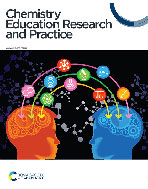Evaluating electrophile and nucleophile understanding: a large-scale study of learners’ explanations of reaction mechanisms
Abstract
A deep understanding of organic chemistry requires a learner to understand many concepts and have fluency with multiple skills. This understanding is particularly necessary for constructing and using mechanisms to explain chemical reactions. Electrophilicity and nucleophilicity are two fundamental concepts to learning and understanding reaction mechanisms. Prior research suggests that learners focus heavily on explicit structural features (e.g., formal charge) rather than implicit features (e.g., an open p-orbital) when identifying and describing the role of electrophiles and nucleophiles in reaction mechanisms; however, these findings come from small-scale, interview-based investigations with a limited number of reaction mechanisms. The work reported herein seeks to further explore the meaning learners ascribe to electrophiles and nucleophiles by evaluating 19 936 written explanations from constructed-response items asking what is happening in reaction mechanisms and why it happens for 85 unique reaction mechanisms across a yearlong postsecondary organic chemistry course. To analyze these data, we developed an electrophile rubric to capture learners’ level of explanation sophistication (Absent, Descriptive, Foundational, and Complex); this electrophile rubric is complementary to a nucleophile rubric previously reported in the literature. Our data show proportional levels of explanation sophistication for electrophiles and nucleophiles (τb = 0.402) across these written explanations of reaction mechanisms. We note that learners’ explanations of nucleophiles tend to be at a higher level than their explanations of electrophiles. While this finding does support prior literature reports, we also found that explanations of mechanisms involving reductions of pi-bonds (e.g., carbonyls) tended to be more sophisticated for electrophiles than for nucleophiles. Overall, our results support the claim that learners are able to discuss both electrophilicity and nucleophilicity; however, learners discuss electrophilicity and nucleophilicity at different levels of sophistication where nucleophilicity predominates for most reaction types.


 Please wait while we load your content...
Please wait while we load your content...